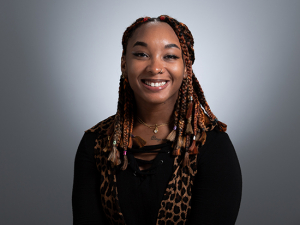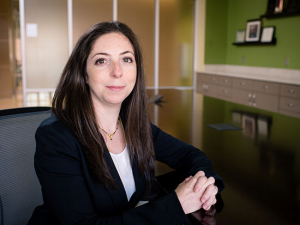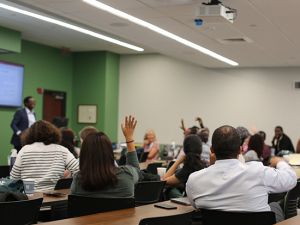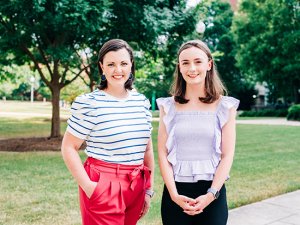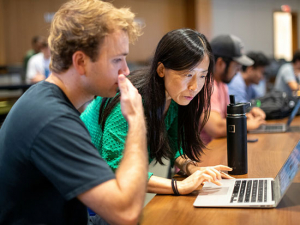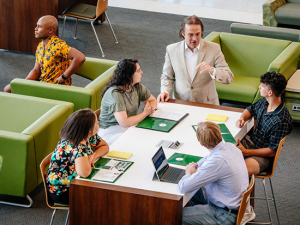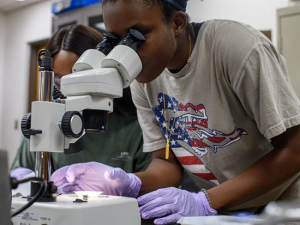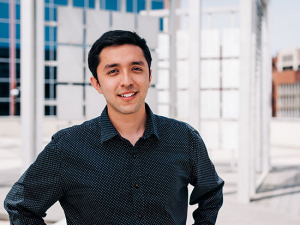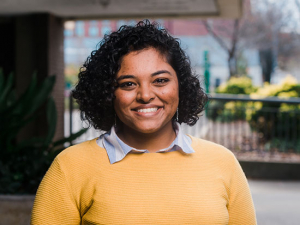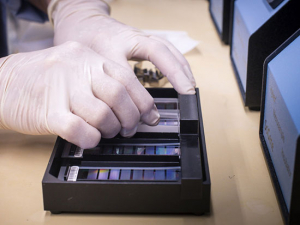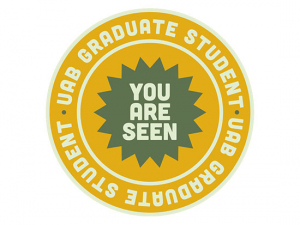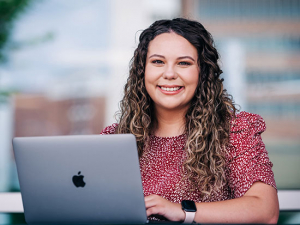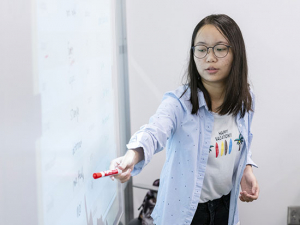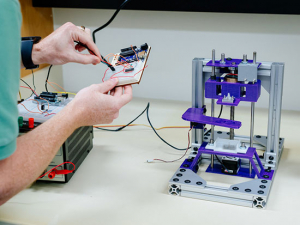Get started with BlazerPulseIn August, Blazers surpassed more than 36,500 logged hours of community service in BlazerPulse. To start using the platform, view the online FAQs or find a BlazerPulse liaison in your unit or email Geren Dunn at ggdunn@uab.edu to schedule a BlazerPulse training session. |
The 2018-19 cohort of Faculty Fellows in Engaged Scholarship have developed ideas to promote active and ethical citizenship, social responsibility and engagement in courses across disciplines, a priority outlined in UAB’s strategic plan, Forging the Future.
Faculty met throughout the year to exchange ideas with an academically diverse group, learn from the experiences of other fellows and develop a syllabus and other tools and resources needed to incorporate service-learning into their course. They also received a $1,500 enhancement grant to support course development and research.
The cohort included Nancy Abney, program manager in the Graduate School Center for the Integration of Research, Teaching and Learning (CIRTL); Sarah Culver, Ph.D., associate professor in the Collat School of Business Department of Marketing, Industrial Distribution and Economics; Jenelle Hodges, Ph.D., instructional design specialist in the School of Education; Samira Laouzai, deputy director and manager of eLearning Services and Quality Assurance for the Division of eLearning and Professional Studies; Yookyong Lee, Ph.D., associate professor in the College of Arts and Sciences Department of Social Work; Angela Lewis, Ph.D., professor in the College of Arts and Sciences Department of Political Science and Public Administration; Kelly Morrison, Ph.D., professor in the College of Arts and Sciences Department of Communication Studies; Pam Paustian, Ph.D., executive director for the Division of eLearning and Professional Studies; Whitney Pollio, Ed.D., instructor in the School of Nursing; Mary Wallace, Ph.D., assistant vice president for Student Experience in the Division of Student Affairs; and Neena Xavier, M.D., assistant professor in the School of Health Professions Department of Clinical and Diagnostic Sciences.
Click through the slideshow to learn more about several fellows' courses.
-
Nancy Abney
Graduate School
Abney is developing GRD 764, “CIRTL Individualized Teaching Experience,” a graduate-level directed study course that will enable doctoral students to serve as teaching fellows to gain mentored teaching practice within their disciplines. CIRTL-trained graduate students and postdocs will design, deliver and assess learning activities that benefit a community partner while gaining practical teaching experience.
Community partners might already be on campus, such as a growing department that needs assistance teaching undergraduate courses, or other local colleges, Abney says. UAB programs already on board include new undergraduate programs in genetics and genomic sciences, housed in the College of Arts and Sciences, and immunology, housed in the School of Medicine. These joint undergraduate degrees are interdisciplinary collaborations and focus on basic sciences with applications to specific areas of medicine.
“This is crucial experience that benefits all stakeholders,” Abney said. “Doctoral students who seek to be faculty get much-needed real-world teaching experience, burgeoning programs get the support of CIRTL-trained practitioners and undergraduates get the benefit of additional active learning that enhances how they can apply knowledge. Using evidence-based teaching practices can have a powerful impact on retention and success in STEM classrooms, which is the ultimate goal of CIRTL.” -
Sarah Culver
Department of Marketing, Industrial Distribution and Economics
Culver, who also is director of the UAB Center for Economic Education in Collat, developed “Environmental Economics in Denmark,” available as EC 308, IB 490 and MBA 690. In the course, students will work on service-learning projects for UAB Sustainability and travel to Copenhagen during fall break.
“I hope students come away with a hope of what could be here at UAB and in Birmingham by visiting a community that had very similar challenges 25 years ago,” Culver said. -
Jenelle Hodges
School of Education
Hodges uses online service-learning in IDD 610, part of UAB’s fully online master’s program in instructional design and development, which trains qualified instructional designers to analyze, design, develop, evaluate and implement quality online, blended and on-ground instruction. In IDD 610, students work with clients to analyze knowledge gaps and design instruction and learning opportunities to help them close that gap.
Students in IDD 610 track their hours spent working with each client in BlazerPulse, an online platform that promotes and measures engagement and scholarship on campus and around Birmingham. The purpose, Hodges says, is to ensure classwork was being accomplished and also help students understand that not every project will come with an easy solution.
“It’s not just for service-learning courses, but for all the different volunteer opportunities that faculty find themselves participating in,” Hodges said. “We have a great university, and this gives us a great way to tell our stories — seeing all the different ways the university as a family is helping our community.”
Hodges piloted ID 610 in BlazerPulse during the spring semester. Read more in the UAB Reporter. -
Samira Laouzai and Pam Paustian
Division of eLearning and Professional Studies
Laouzai and Paustian are developing two service-learning resource courses to be housed in the Canvas learning-management system. The first will provide faculty with resources to help them implement service-learning modules in their courses on topics such as capturing community engagement and professionalism.
The second will provide long-standing community partners with a course shell to prepare students to work at a service-learning location in the community. Each community partner will be able to access modules centered on student orientation, onboarding, available resources and communicating with students.
“The Division of eLearning and Professional Studies looks forward to building an ongoing collaboration with the Office of Service Learning to assist faculty and students in accessing the important aspects of service-learning and supporting community partners,” the pair agreed. -
Whitney Pollio
School of Nursing
Pollio is designing a new nursing course, “Concepts of Transitional Care Coordination,” to be taught each spring. Students will work with eight Birmingham neighborhoods to create a list of available community resources.
Students will wotk with community residents to determine the most valuable resources to list and the information to include, such as business location or hours of operation. They also will complete a reflection assignment to assess the service-learning project as a whole.
“This experience will let students find resources in a real community and help them be able to apply this when working with patients going through a transition of care,” Pollio said. -
Mary Wallace
Division of Student Affairs
Students in Wallace’s 300-level Honors College course, “Adaptive Leadership Abroad,” will travel to the Yunguillas community in Ecuador during spring break 2020. For the past two decades, Yunguillas residents have worked to improve their quality of life, protect their natural resources, develop sustainable activities and create a hospitable and welcoming community, and they have seen positive environmental impacts, Wallace says. Students in her course will work with community members to process dairy and jams, receive environmental education, research forests, learn organic gardening, develop and study nature trails and participate in family farming.
“Students will learn to develop leadership through a community lens by understanding the root causes of a community issue and helping to develop leadership strategies to solve complex world problems,” Wallace said. “Through this model, students develop critical thinking, problem-solving, global fluency and leadership competencies, which are sought-after by employers upon graduation. Understanding root causes helps students understand that solutions are not one-size-fits-all.” -
Neena Xavier
Department of Clinical and Diagnostic Sciences
Xavier redesigned PA 606 and 607, Clinical Medicine I and II, to include a service-learning component. In the clinical medicine courses, students learn to create differential diagnoses and use laboratory data and physical exam findings to determine a final diagnosis.
Xavier aligned her instructional objectives with an existing interprofessional student-run screening clinic the School of Health Professions operates at the Firehouse Shelter, a homeless shelter for men in downtown Birmingham. In the courses, students work in the clinic and then write a critical self-reflection on a health disparity they encountered while working to provide effective patient care and if or how their perceptions of working with a chronically homeless population was affected by the experience.
“I hope students learn to recognize and address health disparities when they are making decisions about how to improve the quality of health for diverse populations they will serve in the future,” Xavier said.

Faculty fellows create team-based research courses








